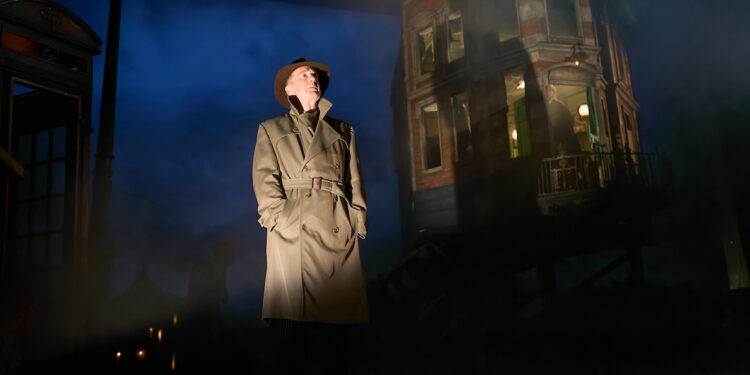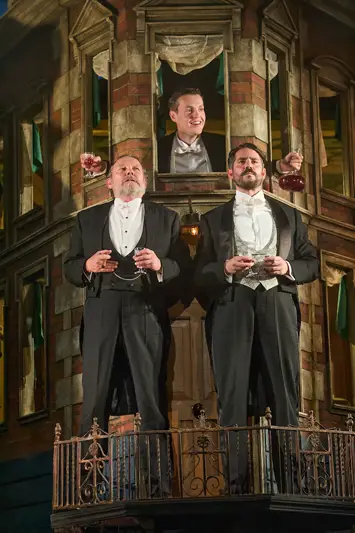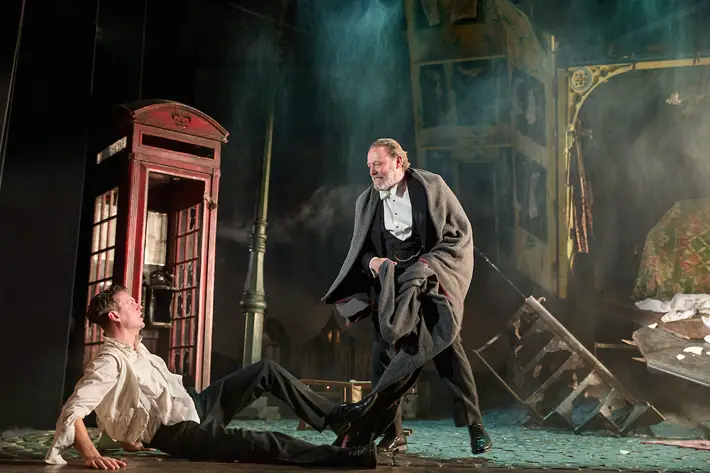An Inspector Calls – Review – Sheffield Lyceum Theatre

By Clare Jenkins, May 2023
As accidents go, it didn’t lack symbolism. Halfway through the Lyceum’s first night of J. B. Priestley’s anti-capitalist critique of social inequality, Christine Kavanagh’s smug matriarch tripped over her Edwardian gown and tumbled down three steps, landing on her silent, much put-upon servant (Frances Campbell). Despite both their best efforts, Kavanagh couldn’t continue with the scene, so the curtain came down while first aid was administered.
The upside of this halt in proceedings was an unexpected toilet break for the hundreds of GCSE students present, and a glimpse of the excitement and unpredictability of live theatre. Real-life drama upstaging the rehearsed sort.
It’s 30 years since I first saw Stephen Daldry’s radical National Theatre production of An Inspector Calls and its impact was enormous. Not just designer Ian MacNeil’s stunning doll’s-house-on-stilts plonked above the detritus of a wartime wasteland, but the whole re-interpretation of a 1945 play about bourgeois individualism vs social responsibility (echoes of Margaret Thatcher’s ‘There is no such thing as Society’ speech), and the meaning of ‘humanity’.
 The stand-out performance then was Kenneth Cranham’s brooding Inspector Goole, the implacably merciless detective whose appearance at the plush home of the prosperous Birling family leads them to tortured soul-searching.
The stand-out performance then was Kenneth Cranham’s brooding Inspector Goole, the implacably merciless detective whose appearance at the plush home of the prosperous Birling family leads them to tortured soul-searching.
“Lost little of its power”
The multi-award-winning production also helped revive interest in the prolific Priestley. Successive generations discovered that, as well as being a genial middlebrow, he could be a biting social commentator. This modern morality play, set just before the First World War, is a searing, ever-relevant, attack on the exploitation of the poor by the rich. It makes you wonder what the lifelong Socialist would make of today’s ‘levelling up agenda’, and the ongoing strikes for workers’ rights.
So now, as part of the longest-running revival of a play in history, An Inspector Calls is back at the Lyceum. But while the script has lost little of its power to shock and the set is still startling, the production itself seems a tad heavy-handed and VERY SHOUTY!! Unlike Alastair Sim’s intimately confessional 1954 film version or the excellent 2015 TV adaptation starring David Thewlis, this is Priestley on a soap-box with a megaphone. Stridency too often replaces subtlety, with voices sometimes competing against not just each other but also Stephen Warbeck’s industrial-scale music.
A small boy (Leonard Bailey) shines a torch around the auditorium before switching on a period wireless. He then tunnels under the curtain, which rises on what looks like a smoking, rain-soaked bomb-site. In their house up above, the Birlings (Arthur, a self-made, self-satisfied Midlands manufacturer, and his wife Sibyl) are celebrating the engagement of their daughter Sheila (Chloe Orrock) to fellow factory-owner Gerald Croft (Simon Cotton).
Immediately a problem arises. What with all the puthering smoke and the fact that everyone is gabbling away behind closed doors, it’s more like an audio drama on a badly tuned radio. The enclosed walls may well symbolise the family’s inward-looking world, but it’s pretty tough on anyone who doesn’t know the play.
“Moral force”
Into this congratulatory atmosphere walks the shadowy figure of the inspector (Liam Brennan). He wants to ask some questions about the recent suicide of a young woman called Eva Smith. What follows is an increasingly uncomfortable uncovering of hypocrisy and casual ill-use of those seen as ‘beneath’ the family. One by one, they have to step out of their cluttered drawing-room onto the verandah and down the steps, to face up to the consequences of their actions. As they do so, they’re watched by a silent community of the underprivileged. Eventually the house, and their world, shatters, and they huddle on the floor among the debris.
Alastair Sim’s inspector was deceptively apologetic, a mild-mannered moral force in a mackintosh. David Thewlis was laconic yet laser-like in his ruthless pursuit of the truth. Liam Brennan declaims. As the play progresses, he grows more impatient, disappearing off stage, divesting himself of his coat, his jacket, checking his watch. Has he got another play to go to? Maybe it’s the same one Jeffrey Harmer’s heading for as he gallops through Arthur Birling’s speeches.
While the play and its messages remain powerful, at times the main characters seem to be performing in an Edwardian melodrama, with bombast and bluster, loud laughter and odd inflections. This is Acting with a capital A. The only one vaguely approaching naturalism is George Rowlands as Eric, the unhappy drunken son. But Frances Campbell is always watchable as the ever-lurking servant Edna, creeping ever nearer to the chair she eventually sits down on to knit, like a French Revolutionary tricoteuse.
All the time, though, the ghosts of previous versions hover.
‘An Inspector Calls’ is on at the Sheffield Lyceum until Saturday, before moving on to Bradford Alhambra May 9-13
images: Mark Douet










